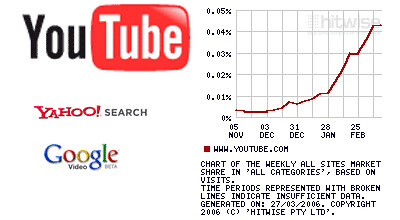Dot com deja vu
Having lived and died (figuratively) during the dot com, the Google/Youtube does smack of the exuberance of late 90's to me. Neither YouTube nor MySpace had business models beyond advertising yet both commanded valuations that would put traditional enterprise software deals to shame. However, I like what Michael Urlocker pointed out in his recent post on the matter. He quoted Peter Drucker's old adage that the only valid definition of business purpose is to create customers. In the case of YouTube and MySpace, their customers are advertisers and their assets are eyeballs, millions of them.
Mike nailed it when he says that YouTube succeeds because it is immediate gratification, quick fixes, reality TV, social relevance and is contextually sound. I've pushed the concept of value - change required = adoption very often in this blog. i.e. the value of something must be far greater than our requirement for our customers to change the way they work or behave, otherwise adoption will not happen. For YouTube, the value may not be huge, but the barrier to entry is just a click away and usually, the gratification is over in minutes. Your commitment to action is a no brainer compared to choosing say a movie in which you may have to sit through a couple of hours to realize it wasn't worth it after all.
The biggest question is whether they can be true to their purpose and make money. Only too often, companies die because the need to make money takes them away from the fundamental purpose of their existance in the first place.
Mike nailed it when he says that YouTube succeeds because it is immediate gratification, quick fixes, reality TV, social relevance and is contextually sound. I've pushed the concept of value - change required = adoption very often in this blog. i.e. the value of something must be far greater than our requirement for our customers to change the way they work or behave, otherwise adoption will not happen. For YouTube, the value may not be huge, but the barrier to entry is just a click away and usually, the gratification is over in minutes. Your commitment to action is a no brainer compared to choosing say a movie in which you may have to sit through a couple of hours to realize it wasn't worth it after all.
The biggest question is whether they can be true to their purpose and make money. Only too often, companies die because the need to make money takes them away from the fundamental purpose of their existance in the first place.









1 Comments:
"Only too often, companies die because the need to make money takes them away from the fundamental purpose of their existance in the first place."
I think you mean companies often die because they forget about what makes them valuable to their customers - companies exist to make money, that's their definition.
I think YouTube has been pretty single-minded in looking after their users. That seems to be everyone's biggest criticism.
However, they're all wrong. Google didn't make any profit till year 3 or 4. They didn't even work out how they might do that till year 2.
Post a Comment
<< Home